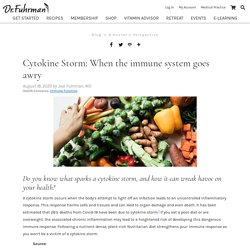

Cytokine Storm: When the immune system goes awry. Do you know what sparks a cytokine storm, and how it can wreak havoc on your health?

A cytokine storm occurs when the body’s attempt to fight off an infection leads to an uncontrolled inflammatory response. This response harms cells and tissues and can lead to organ damage and even death. It has been estimated that 28% deaths from Covid-19 have been due to cytokine storm.1 If you eat a poor diet or are overweight, the associated chronic inflammation may lead to a heightened risk of developing this dangerous immune response. Following a nutrient-dense, plant-rich Nutritarian diet strengthens your immune response so you won’t be a victim of a cytokine storm. Source: The trinity of COVID-19: immunity, inflammation and intervention. Let’s take it from the top. Cytokines are a category of proteins that play an important role in cell signaling. So now we know that certain types of immune cells release cytokines as a form of communication with other cells.
Differential diagnosis: cold, flu or COVID-19? Source: Shutterstock.com A new continuous cough, a high temperature and a loss or change in sense of smell or taste are the main symptoms of COVID-19 As the days become shorter and the temperature falls, the frequency of seasonal viral infections — such as cold and influenza (flu) — increases.

Cold and flu share some symptoms and, if managed effectively, are often self-limiting and resolve within a couple of weeks in people without pre-existing conditions. However, some of their symptoms are similar to those seen in COVID-19 infections, which will present a challenge for healthcare professionals. This winter, an increasing number of patients will likely present in pharmacy and primary care with symptoms of a viral infection, and be justifiably concerned about what the next steps — with regard to managing their symptoms — should be.
Symptoms The novel coronavirus SARS-CoV-2, commonly referred to as COVID-19, typically causes mild upper respiratory infections[1]. The main symptoms include: Flu Natural Remedies: 12 Ways to Relieve Flu Symptoms - DrAxe.com. People with a depressed immune system or nutrient deficiencies may be more prone to catching the flu or a cold.

Stress, lack of sleep and exposure to toxins can worsen flu symptoms. According to a report published by the Centers for Disease Control and Prevention (CDC) on December 8, 2017, flu activity has been increasing in the U.S. since early November. Based on data from October 1 to November 25, 2017, researchers found Influenza A viruses predominated in all age groups and Georgia, Louisiana, Massachusetts and Oklahoma all had widespread flu activity. (1) Luckily, there are flu natural remedies that can help. What Is the Flu? The flu is a contagious respiratory illness caused by the influenza virus. Elderberry Elixir for the Common Cold. The common cold is usually a minor illness that is self-limiting.

It resolves in a week or so with or without treatment. Unless you are chronically ill or debilitated, it is unlikely to have serious consequences; but it can cause plenty of misery and days lost from work. Science has made great progress in other areas, but it has found no cure for the common cold. Antibiotics are useless. For prevention, the best science can offer is handwashing. In desperation, many people have resorted to herbal remedies, folk remedies, and supplements like zinc, Vitamin C, and Echinacea.
Black elderberry is a nutritious fruit with high concentrations of anthocyanins; it has twice as much antioxidant capacity as blueberries and significantly more than cranberries. Placebo-controlled studies In contrast to many supplements on the market, there are studies that used the same brand, Sambucol; and randomized, placebo-controlled, double blind studies have been done. This Natural Supplement May Work Better Than Prescription Antiviral Medication. Natural Approaches to Cold & Flu Season. How Does the Immune System Work? Here's The Science Behind Your Immune System & How to Keep it Strong.
We often talk about how we want to maintain healthy immune systems—for overall wellness, to fend off seasonal woes and to live longer and healthier lives.

But do you understand how this important bodily system works on a biological level? Knowledge is power, after all, so in this article, we’re breaking down the science behind your immune system, plus healthy habits and immune support supplements that can help your immune system function optimally. What Exactly is the Immune System? The immune system is a network of specialized cells, organs, proteins and tissues in your body responsible for protecting you from external biological influences.1 It has the innate ability to distinguish between your tissue and foreign tissue, and it can even recognize and eliminate dead or faulty cells.
Supporting the health of your immune system is the best way to ensure that it can do its job. White Blood Cells and the Immune System White blood cells are a critical component of the immune system. Sources. Want to Make Your Own Hand Sanitizer? Here's How to DIY Your Own. Handwashing Kills Germs Science tells us—as did most of our parents—to wash your hands.

It’s one of the most important steps to prevent the spread of germs and to avoid getting sick.1 In fact, studies have shown that handwashing can prevent 1 in 5 respiratory infections, like the cold or the flu, and 1 in 3 diarrhea-related sicknesses.2 Soap Types & Germs The Centers for Disease Control and Prevention notes that bar soap and liquid soap are both effective, and that there is no added benefit to using antibacterial soap compared with plain soap.
All of the above soaps are equally effective at killing germs.2. Natural Approaches to Cold & Flu Season. 12 Natural Cold Remedies Examined: What Works and What Doesn't. Cold season is upon us.

Vitamin D levels are down. People are cloistered indoors. Kids are walking petri dishes. Drug stores are advertising free flu shots. It’s that time of year. Colds seem like an inevitability, maybe not so much since you’ve cleaned up your diet, but nothing is 100% fool-proof. Let’s look at them. High Dose Vitamin C Most studies find that vitamin C supplementation has little to no effect on the duration or severity of a cold. In one study, taking 8 grams on the first day of the cold reduced illness a bit more than taking 4 grams. Ginseng Extract Safely Reduces Incidence, Recurrence of Respiratory Infections.